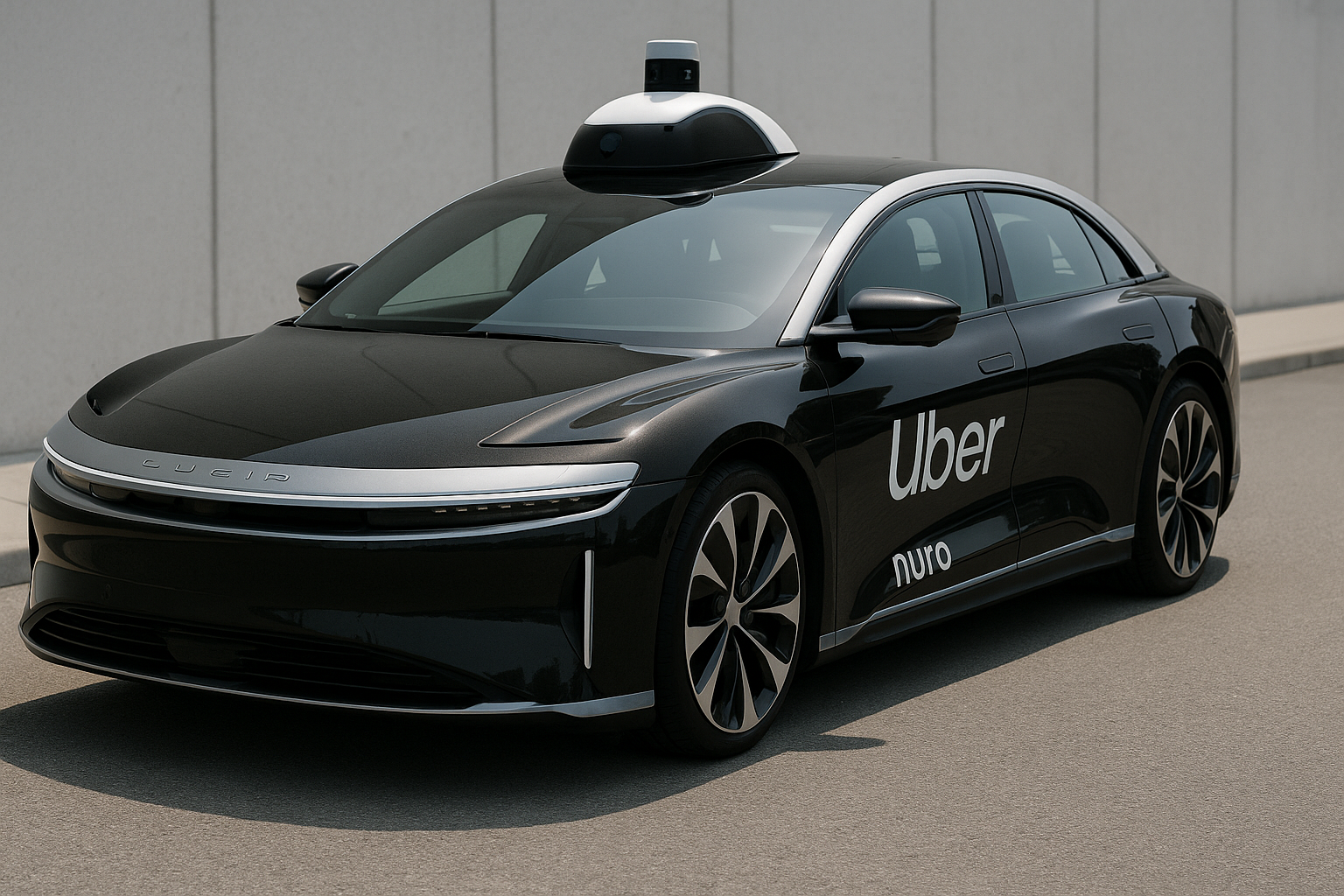
In a move poised to shake up the future of transportation, Lucid Motors (NASDAQ: LCID), autonomous delivery startup Nuro, and ride-hailing giant Uber (NYSE: UBER) have announced a strategic partnership to develop and deploy a next-generation robotaxi network. This alliance brings together some of the brightest minds and boldest technologies in electric vehicles, artificial intelligence, and mobility services, with the goal of transforming how people and goods move across urban landscapes.
The Vision: Seamless Urban Mobility
Urban mobility is at a tipping point. Increasing congestion, concerns over emissions, labor shortages, and shifting consumer preferences have forced automakers and tech giants alike to rethink traditional models. Lucid, known for its luxury electric vehicles and advanced battery systems, is leveraging its manufacturing prowess and EV technology to create a scalable, energy-efficient platform for autonomous ride-hailing.
Nuro, a leader in autonomous delivery robotics, adds expertise in AI-driven navigation, sensor integration, and regulatory compliance for self-driving vehicles. Uber, with its massive user base, logistical infrastructure, and experience orchestrating millions of daily rides, provides the distribution platform and data-driven insights necessary to launch a robotaxi network at scale.
Together, the three companies aim to launch pilot programs in major U.S. cities within the next year, with the intention of rapidly expanding to additional markets as regulatory and technological hurdles are cleared.
Strategic Drivers of the Partnership
The partnership is built around several key strategic imperatives:
- Electrification and Sustainability: Lucid’s electric vehicle platforms, renowned for high range and fast charging, will serve as the foundation for the robotaxi fleet. This supports Uber’s ongoing pledge to achieve a fully electric fleet by 2030 in key markets.
- Autonomous Capability: Nuro’s software stack, already proven in the delivery sector, will be adapted and scaled for urban passenger transport. By combining real-time data, machine learning, and robust safety protocols, Nuro’s platform is designed to navigate complex city environments with high reliability.
- Service Integration: Uber will handle the user-facing elements—matching riders with vehicles, optimizing routes, and managing payments—while leveraging its analytics to balance supply and demand, minimize wait times, and improve the customer experience.
Financial Implications and Market Impact
The robotaxi market is projected to reach hundreds of billions of dollars over the next decade. Analysts forecast that by 2030, autonomous vehicles could account for as much as 25% of urban rides in major cities globally. For Lucid (NASDAQ: LCID), this partnership opens a new revenue stream and accelerates its ambition to move beyond consumer retail into fleet and mobility services—a sector with higher volume potential and recurring income through vehicle servicing and data monetization.
For Nuro, the deal provides an entry into the lucrative passenger segment, diversifying its revenue base beyond grocery and parcel delivery. The company is expected to invest heavily in expanding its autonomous technology for multi-purpose vehicles, broadening its portfolio and increasing its attractiveness to investors and potential acquirers.
Uber, whose business model has long relied on contract drivers, stands to benefit from reduced labor costs, increased vehicle utilization rates, and a significant reduction in safety incidents. The company’s access to rider data and city-specific insights gives it an edge in deploying and optimizing robotaxi operations.
Challenges and Competitive Landscape
While the opportunity is enormous, execution will not be without challenges. Regulatory barriers remain significant, as self-driving vehicles must meet stringent federal, state, and local requirements for passenger safety and data privacy. Public acceptance, while growing, is not universal, and the transition from pilot programs to large-scale commercial deployment will require careful management of technology risks, insurance, and incident response.
Competition in the autonomous vehicle space is fierce. Tesla (NASDAQ: TSLA), Alphabet’s Waymo (NASDAQ: GOOG), General Motors’ Cruise (NYSE: GM), and Chinese companies like Baidu (NASDAQ: BAIDU) are investing billions in parallel efforts. However, the Lucid-Nuro-Uber alliance is unique in that it marries world-class EV technology with autonomous expertise and a dominant mobility platform, potentially leapfrogging more siloed approaches.
The Road Ahead
The initial phase of the partnership will focus on the deployment of several hundred robotaxis in select metro areas, with riders able to hail the vehicles through the Uber app. Lucid will supply purpose-built EVs designed for comfort, safety, and maximum up-time, while Nuro’s AI and sensors enable fully driverless operation in geo-fenced urban corridors.
If successful, the collaboration could become a blueprint for public-private partnerships, infrastructure modernization, and workforce retraining, as cities reimagine their approach to transportation planning.
Conclusion
The union of Lucid, Nuro, and Uber represents a bold bet on a future where autonomous, electric vehicles seamlessly connect people and goods in safer, greener, and more efficient ways. For investors, the partnership is an early glimpse into the convergence of mobility, technology, and electrification—a space likely to define the next era of urban living.
Disclaimer: This article is for informational purposes only and does not constitute financial advice or a recommendation to buy or sell any securities. Always conduct your own research or consult a professional before making investment decisions.




